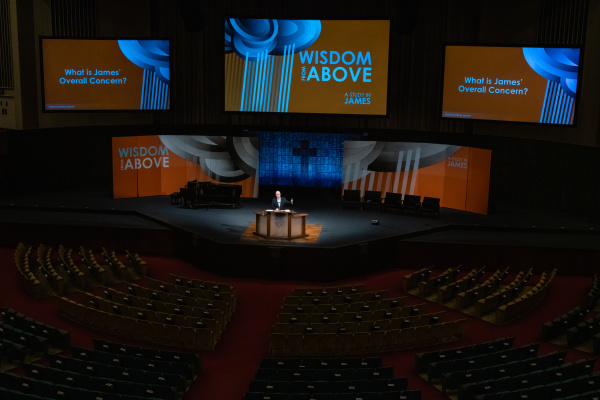Psalms 1:1–2
Blessed is the man that walketh not in the counsel of the ungodly, nor standeth in the way of sinners, nor sitteth in the seat of the scornful. But his delight is in the law of the Lord; and in his law doth he meditate day and night.
Psalms — the world’s most important book of poetry — begins with a picturesque contrast of two paths: the way of the righteous and the way of the wicked. According to Psalm 1, a blessed person distinguishes himself by delighting in God’s Word instead of listening to worldly counsel (1:1–2). Rather than curiously mulling over ungodly advice, he meditates on revealed truth “day and night.” The Hebrew word translated meditate conveys intense consideration, to the point of muttering or repeating words over and over.
Bible meditation in our fast-paced, technology-fueled society is not easy. It’s an uphill climb with plenty of challenging crosswinds. We process so many texts and tweets and ten-second video clips that we have hardly any time or attention left. But the strength that develops in a heart full of God’s loving truth surpasses any ease offered by any other route. That’s why our study in James includes this final chapter. We need to retrace our steps and recall the features of this path of wisdom from above. Reviewing the message and themes of this passage will renew our minds so that we can be “doers of the word, and not hearers only” (James 1:22).
Recognizing Divine Wisdom
James 3:13–18
Who is a wise man and endued with knowledge among you? let him shew out of a good conversation his works with meekness of wisdom. But if ye have bitter envying and strife in your hearts, glory not, and lie not against the truth. This wisdom descendeth not from above, but is earthly, sensual, devilish. For where envying and strife is, there is confusion and every evil work. But the wisdom that is from above is first pure, then peaceable, gentle, and easy to be intreated, full of mercy and good fruits, without partiality, and without hypocrisy. And the fruit of righteousness is sown in peace of them that make peace.
Interstate highways are a marvelous invention. They facilitate efficient, direct travel between major cities, as long as you are heading in the right direction. Have you ever experienced that sickening realization that you’ve been driving the wrong way for a while? Perhaps you noticed landmarks you had never seen before. Maybe the digitized GPS voice cleverly uttered that dreaded word, “Recalculating.”
James writes as one of the early church leaders in Jerusalem to Jewish Christians so that they might become spiritually mature. And this maturity necessitates wisdom from above. In the final paragraph of James 3, he raises the question of how to identify a wise person and then describes the telltale signs. If we slow down and notice our surroundings, we will understand whether or not we are obtaining and employing God’s wisdom. Or to change the analogy, there is unmistakable fruit. We recognize the source of wisdom by the fruit it bears in everyday life.
We must assess the fruit that is coming from our lives personally and collectively. On one hand, wisdom from below produces jealousy and sinful ambition, which lead to chaos and many manifestations of evil. On the other hand, wisdom from above demonstrates itself in both actions and attitudes. It leads to purity and peace, to reasonableness and gentleness and compassion, to consistency and sincerity. God structured life to work when we prayerfully and humbly apply His knowledge to our everyday circumstances.
Acknowledging Worldly Affections
James 4:1–5
From whence come wars and fightings among you? come they not hence, even of your lusts that war in your members? Ye lust, and have not: ye kill, and desire to have, and cannot obtain: ye fight and war, yet ye have not, because ye ask not. Ye ask, and receive not, because ye ask amiss, that ye may consume it upon your lusts. Ye adulterers and adulteresses, know ye not that the friendship of the world is enmity with God? whosoever therefore will be a friend of the world is the enemy of God. Do ye think that the scripture saith in vain, The spirit that dwelleth in us lusteth to envy?
At the beginning of James 4, the author exposes the reasons his readers were acting selfishly and sensually. Professing Christians may fight for petty reasons, such as the auditorium carpet color or preferred slots on the offertory schedule. But even the most ridiculous squabbling has underlying causes. James calls them lusts. These lusts are the fleshly desires we seek to fulfill in unlawful, unloving ways. When we ignore God’s wisdom, we give way to powerful cravings corrupted by sin. And when we interact with one another, our uncontrolled desires produce conflicts and fighting.
God has given us resources to access His wisdom, but like James’s readers, we often fail to make use of them. We do not experience victory over sinful passions because we do not pray. And when we do pray, many times our motives distort our petitions. We pray for what we want with little thought of what God wants. “Envying and strife … confusion and every evil work” (3:16) are not the results of incompatible personalities or age differences or budget deficiencies. God’s people fight because our flesh puts itself above God’s kingdom and people.
It is one thing to admit we fight because we are selfish. It is another to acknowledge that our affection for this world makes us enemies of God. James minces no words. Although he refers to his readers as brothers fifteen times in his letter, in this paragraph James calls them adulterers and adulteresses (4:4).
The sinful desires that go unchecked and burst into skirmishes with others expose disloyalty to our Savior. We cannot serve God and the world simultaneously. As the hymn writer testified, “Prone to wander, Lord, I feel it, prone to leave the God I love.”¹ This spiritual adultery is serious, just like it was for Israel to worship Canaanite gods. It arouses the jealousy of the spirit God put within us. We belong to Him. But when we do not seek wisdom from above, trailing off the path and flirting with the spirit of our age seem okay.
Submitting to Transforming Grace
James 4:6–10
But he giveth more grace. Wherefore he saith, God resisteth the proud, but giveth grace unto the humble. Submit yourselves therefore to God. Resist the devil, and he will flee from you. Draw nigh to God, and he will draw nigh to you. Cleanse your hands, ye sinners; and purify your hearts, ye double minded. Be afflicted, and mourn, and weep: let your laughter be turned to mourning, and your joy to heaviness. Humble yourselves in the sight of the Lord, and he shall lift you up.
Even though his indictment of spiritual adultery is scathing, James does not leave us without hope. Paired with the righteous jealousy of God is His abundant grace. God knows that we are sinful people laden with fleshly desires that will not be remedied this side of glory. As a lovingly jealous husband, He is neither indifferent to our sin nor willing to let us go and perish. He gives us grace as we humble ourselves. He is high and holy, but He chooses to dwell with the contrite and lowly (Isa. 57:15).
But how do we know if we are humble? What does it look like to submit ourselves to God and renew our minds in His wisdom? James sketches an active portrait of humility. Those who are humble before the Lord strongly oppose the Devil (just as God strongly opposes the proud). At the same time, the humble seek close fellowship with the God to whom they have been disloyal. We experience this renewed relationship through purity, both in our hearts and in our lifestyle, and repentance. Pride seeks to avoid consequences. Humility seeks restoration whatever the cost. God has more than enough transforming grace for those who humbly submit to Him.
Sometimes we view humility as the absence of outrageous vanity and boasting. But evaluating our pride should go much deeper than such surface observations. Consider the following questions:
- Am I a critical and gossiping person?
- Do I regularly question authority?
- Do I make fun of weaker, less-privileged people? Do I treat people differently based on their status?
- Am I dissatisfied with God’s Word as sufficient for life and godliness?
- Do I make plans without making the Lord the center of my focus?
- Do I shift blame instead of taking responsibility for my actions?
- Do I widely proclaim my views but rarely listen? Do I hold grudges instead of extending forgiveness?
- Do I put up a front instead of confessing my faults to those who can help?
- Do I pray sparingly?
The point of these questions² is not to drive you simply to do better. Answering yes to some of these questions is the first step toward repentance and receiving God’s grace, because a humble person is honest. He understands what David confessed — that God wants us to have integrity in our hearts (Ps. 51:6). Recognizing spiritual unfaithfulness and pride does not mean we pull ourselves up by our own bootstraps. It means running to Christ for superabundant grace. It means humbling ourselves to get back on the path of wisdom from above.
¹ Robert Robinson, “Come, Thou Fount of Every Blessing” (1757).
² Questions adapted from a Sunday school lesson by Jim Wiginton, Mt. Calvary Baptist Church, Greenville, SC, May 3, 2015.
This post is from Wisdom from Above: A Study in James by Steve Pettit. Copyright 2015 by BJU Press. Printed by permission of BJU Press.








